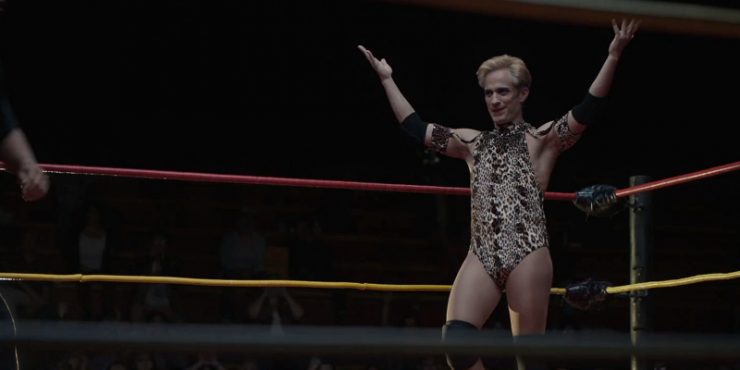Gael García Bernal is one of the few performers in movies today who is truly peerless. The Mexican actor has been working consistently for over two decades both in and out of Hollywood. His boyish good looks and adolescent body means he can often play much younger than he actually is, even if his graying hair and pained eyes often give away that he is now in his mid-40s. His latest film, Cassandro, is a fantastic showcase of everything he is as a performer: effortlessly funny, unafraid of frank sexuality, with a deep pool of vulnerability that can explode into bombastic intensity. Cassandro is not a great film overall, but it is a very good Gael García Bernal film, where he gets to reach a peak the movie itself never finds.
Based on a true story, García Bernal plays Saúl Armendáriz, a Mexican-American luchador living in El Paso who crosses the border into Juarez so he can lose minor league wrestling matches to hulking behemoths who treat him like a runt. He lives with his mother, Yocasta (Perla De La Rosa), who had Saúl with a married man. Saúl’s father used to be a larger presence in his life, despite his illegitimacy, but when Saúl came out as gay as a teenager, the part-time father vanished completely. It was this absent father who introduced Saúl to the beauty of professional wrestling, in particular the lush flamboyance of Mexican lucha libre. Saúl wants the superstardom of the greats he used to watch on television as a child, but climbing the circuit seems impossible, with the local crowds always preferring classical masculinity to his effeminate panache.
When he decides to train with a professional, Sabrina (Roberta Colindrez), she suggests that he can break through as an exótico. Exóticos are luchadors who wrestle in drag, play up gay stereotypes, and almost always lose. Usually an undignified position, Saúl needs a lot of convincing, but he soon after creates the character of Cassandro, a sassy wrestler with a flair for putting his opponents in compromising positions. At first, Cassandro’s ostentatious extravagance courts the ire of the conservative crowds, but he quickly wins himself a passionate fanbase, enough that he’s even able to convince promoters to actually let him win. Saúl’s transformation into Cassandro earns him great fame in the ring, but he must still contend with the trauma of a father who abandoned him for his sexuality, and the mother who still openly resents him because of it.
Where Cassandro struggles is really balancing the stakes of Saúl’s journey in the ring and out of it. The story takes very familiar roads toward a highly predictable conclusion that feels all too convenient. The script (by director Roger Ross Williams and David Teague) shows glimpses of a very complicated family dynamic. Neither of Saúl’s parents truly accept his sexuality, but while his father completely disowns him, his mother dotes on him with a wealth of love, while openly complaining of the inconvenience of her son’s queerness. The film has an opportunity to deal with some very difficult questions regarding sexuality and culture, but the movie mostly abdicates that responsibility. Williams is a veteran documentarian, but Cassandro is his first narrative film, and it suffers from erratic pacing, as if it was edited to be watched in chunks at home on Amazon Prime Video (where it will be unceremoniously dumped in one week’s time).
Cassandro leans on its main star to create the drama that the script lacks. When you have Gael García Bernal, you can almost get away with it. This isn’t new ground for him. He’s played explicitly queer or queer-coded characters, and his success in that regard seems to mean he’s one of the few straight actors who can do this without catching skepticism. García Bernal sells Saúl’s transformation; the dual reality that he’s becoming a different person while also becoming something that’s closer to his real self than ever before. There’s a doomed romance with a married wrestler (Raúl Castillo), and some flirtations with a young drug dealer (Bad Bunny), but Cassandro takes the smart move of focusing itself mostly on Saúl’s growing love for himself. The real Cassandro amassed great fame, and gets credit for de-stigmatizing queerness in Mexico. The movie doesn’t connect those dots as smoothly as you’d like, but with García Bernal at the helm, you have no trouble believing that he can win over a crowd.
Directed by Roger Ross Williams










